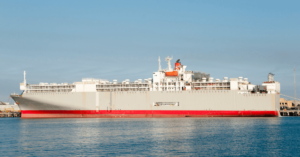
Poland Demands EU Sanctions On Ship Captains Damaging Baltic Cables
February 7, 2025
Kongsberg Maritime Unveils Solutions To Industrialise Floating Offshore Wind Turbine Installation
February 7, 2025

Authorities at Dover Port have intercepted an illegal transport of 20 horses, just a year after a similar incident in which 26 horses were rescued from smuggling attempts.
Despite the Animal Welfare (Livestock Exports) Act 2024, which bans the export of live animals for slaughter, authorities suspect that some of these horses were being smuggled for slaughter and fattening in mainland Europe.
The horses included Irish Thoroughbreds, Connemaras, and leisure ponies, as well as a few that were being transported legally. Many of them were in critical condition, crammed into an unsuitable lorry under shocking conditions.
Officials at Dover were alerted to the transporter and, upon inspection, found a foal lying on the floor, unable to stand. This raised concerns about the condition of the other horses, after which the authorities redirected the lorry to a holding yard for further examination.
Once there, inspectors found that many of the horses were too weak and sick to travel. Some were suffering from strangles, a highly contagious bacterial infection that causes painful abscesses and fever. Others had pneumonia, skin diseases, and other serious health issues.
Among the rescued horses were three unhandled foals, covered in filth, who appeared completely terrified. Reports from the scene described how they huddled together in fear, burying their heads into each other when approached. Some of the other horses, which had been well cared for in the past, were now malnourished, weak, and showing signs of distress.
Video Credits: World Horse Welfare/YouTube
Veterinary examinations confirmed that five Irish Thoroughbreds were in such poor health that they had to be euthanised. Experts also raised serious biosecurity concerns, as the infected horses posed a risk of spreading contagious diseases to others they had come into contact with.
Seven of the horses, which were in better condition, were claimed by their owners. However, eight including the frightened foals and a pregnant mare were abandoned, leaving their care in the hands of animal welfare organisations.
World Horse Welfare, one of the organisations involved in the rescue, stated that while the law is an important step forward, it is not enough to stop illegal transport operations.
The organization’s chief executive, Roly Owers, warned that without a robust digital equine identification and tracking system, smugglers would continue to exploit loopholes and transport horses out of the UK for profit.
“We are once again dealing with the reality that horses are still being illegally exported, despite the law being in place,” Owers said. He stressed that without proper enforcement and tracking systems, cases like this will continue to occur, putting horses’ welfare at serious risk.
Following the interception at Dover, World Horse Welfare took responsibility for the abandoned horses, ensuring they received medical treatment and rehabilitation. The charity also received financial support from Retraining of Racehorses (RoR) to cover costs for the two surviving Irish Thoroughbreds.
RoR’s Head of Welfare Operations, Philippa Gilmore, expressed disappointment that the illegal transportation of horses for slaughter is still happening, despite new regulations.
The rescued horses were transferred to World Horse Welfare’s Hall Farm Rescue and Rehoming Centre in Norfolk, where they are now receiving proper care. Efforts are being made to find safe and permanent homes for them once they recover.
Animal welfare experts are urging stricter enforcement of equine transport laws, calling for an improved identification and tracking system to prevent illegal smuggling.
Reference: worldhorsewelfare
Source: Maritime Shipping News


